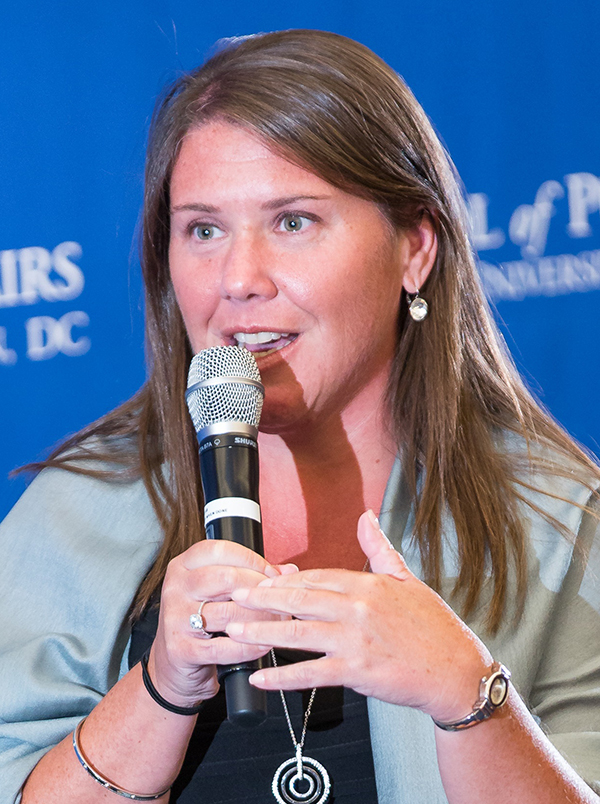Gender and politics expert examines sexism in campaigns
By Linda B. Glaser

Jennifer Lawless, a nationally recognized expert on women in politics, gave the final talk in the Making of the President Series on Nov. 14 to a packed Lewis Auditorium in Goldwin Smith Hall.
Lawless, a professor at American University, based the talk on her recent book, “Women on the Run: Gender, Media and Political Campaigns in a Polarized Era,” co-written with Danny Hayes, in which she examines the reasons for the underrepresentation of women in politics.
Three basic reasons underlie the problem, according to Lawless. The first is situational: Women haven’t traditionally pursued professions that tend to lead to political careers, like law and business. “Their numbers are getting better in those professions though, so the conventional wisdom is that over time they’ll wind up serving in positions of political power as well; we just have to be patient,” said Lawless.
A second reason is the structural barrier created by the incumbency advantage, said Lawless: Most incumbents run for re-election, and they almost always win. In a field where there are few women to begin with, that incumbency advantage makes it harder for their numbers to increase.
The third main reason for women’s lack of participation in politics is the gender gap in political ambition, said Lawless. Her research found that women were a third less likely to consider running for office. That number did not change between 2001 and 2011, nor did Lawless find any difference in political ambition among college students.
A major reason for this lack of political ambition, said Lawless, is the false perception among women that they have to be twice as good as men to get half as far and would have to overcome obstacles that men don’t because of sexism.
“But [in non-national campaigns] we found little evidence of explicit – or even implicit – sexism on the campaign trail or that women and men run different kinds of campaigns,” said Lawless, who also found that female candidates raise the same amount of money as men do and win as often.
Whether people think that female politicians are treated in a sexist way had a great deal to do with whether they perceived treatment of Hillary Clinton and Sarah Palin in 2008 as sexist.
“The national lens through which people experience politics, and through which they see these high-profile politicians navigate the campaign trail, shapes the way they assume candidates at all levels of office will experience politics,” said Lawless. “This is obviously problematic if we care about increasing women’s representation, because … if we’re holding [all] potential candidates to the bar of being able to withstand what a presidential candidate would have to withstand, then it’s going to be very difficult to encourage women to run for office.”
Lawless found that the best predictor of whether someone runs for office is whether anyone has suggested they do so. But women are much less likely to have someone suggest that they run for office, creating a gender gap in political recruitment as well.
“The main reason we wrote the book was to debunk the myth about widespread systematic sexism on the campaign trail,” said Lawless, “so that potential candidates would be more inclined to think that they were qualified.” Because, she continued, women not running for president don’t actually need to surmount obstacles that men don’t have to deal with. Lawless also said she wanted to encourage recruiters to think more broadly about the kind of candidates they recruit, since women in nonpresidential campaigns aren’t more likely to get covered in a negative way or to have a harder time raising money.
Lawless’ talk was jointly supported by the Belnick Presidential Forum and the Riger-Potash Family Fund and sponsored by the Ethics and Public Life Program in the College of Arts and Sciences.
Linda B. Glaser is a writer for the College of Arts and Sciences.
Media Contact
Get Cornell news delivered right to your inbox.
Subscribe